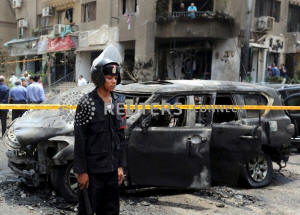|
Special Report: Egypt kills hundreds of
suspected militants in disputed gun battles
 Send a link to a friend
Send a link to a friend
 [April 05, 2019]
By Reuters staff [April 05, 2019]
By Reuters staff
CAIRO (Reuters) - Mohamed Abu Amer, a
landscape gardener, was working in downtown Cairo when national security
agents took him away on Feb. 6, 2018, his family said.
For almost six months Amer's family waited for news of the 37-year-old
father of two. Their messages to the Public Prosecutor and the Interior
Ministry, which oversees the police and the national security agency,
went unanswered.
Then on July 31, the ministry announced on its Facebook page that Amer
was among five terrorists killed in a shootout earlier that day when
police approached their hideout 40 km north of Cairo. Amer was wanted
for the murder of a national security agent, the statement said.
It's a version of events his family doesn't buy. Amer was no terrorist
and he died in the custody of the state, not in a gun battle, his
relatives insist. "I know that what they are saying is untrue," said a
relative. "He was with them for six months."

Amer was one of 465 men killed in what the Interior Ministry said were
shootouts with its forces over a period of three and a half years, a
Reuters analysis of Interior Ministry statements has found. The
announcements reviewed by Reuters appeared on the ministry's social
media or were published by the state news agency.
The killings began in the summer of 2015. In June that year, Islamist
militants had assassinated Egypt's chief prosecutor, Hisham Barakat, an
ally of President Abdel Fattah al-Sisi. Sisi responded with a sweeping
anti-terrorism law that shielded the police and military from
prosecution for the proportionate use of force. Human rights groups say
it was the start of a brutal crackdown. A researcher at an Egyptian
organization that documents human rights abuses said police embarked on
a spate of "extra judicial killings knowing that no one will hold them
accountable."
In 108 incidents involving 471 men, only six suspects survived,
according to Interior Ministry statements from July 1, 2015 to the end
of 2018. That represents a kill ratio of 98.7 percent. Five members of
the security forces were killed, the statements said. Thirty seven were
injured.
The Interior Ministry issued crime scene photographs with some of the
statements. They showed bloodied bodies with assault rifles or shotguns
on the ground beside them. Almost all of the statements said arms and
ammunition were recovered at the scene. Some said Islamic State flyers
were found.
But in interviews with Reuters, the relatives of 11 of the dead men
contradicted the official accounts. Their sons, brothers or husbands had
been plucked by police or national security agents from the streets or
their homes and disappeared, they said, in some cases for several
months. Then came news of their deaths in an Interior Ministry Facebook
post or statement.
The families said none of the young men carried arms. But some were
supporters of the Muslim Brotherhood, a movement that was outlawed in
2013 after Sisi led the military in toppling Egypt's first Muslim
Brotherhood president, Mohamed Mursi.

Reuters showed three forensic experts mortuary images of two of the 11
dead men. These specialists cast doubt on the Interior Ministry's
account of the two men's deaths.
Three witnesses to one deadly encounter – the shooting of two members of
the Muslim Brotherhood, Mohamed Kamal and Yasser Shehata, in a Cairo
apartment block in 2016 – disputed the Interior Ministry's report of a
gun battle with its forces. There was no exchange of fire or gun fight,
these witnesses said.
The U.S. State Department's latest annual report on human rights in
Egypt, released in March, said abuses included arbitrary or unlawful
killings by the government or its agents, forced disappearances and
torture. The United States, nevertheless, has unfrozen $195 million in
military aid to Egypt which it had previously withheld in part because
of concerns over Egypt's human rights record. U.S. officials reason that
security cooperation with Egypt is important to U.S. national security.
Kate Vigneswaran, senior legal adviser at the International Commission
of Jurists' Middle East and North Africa program, said the killings
described by Reuters could "constitute extrajudicial executions, a
serious crime under international law." Evidence that victims were shot
at close range would "indicate that the use of lethal force was not a
response to a legitimate threat, but rather premeditated and deliberate
conduct by the security forces to execute individuals outside the
protection of the law."
Kevin Jon Heller, associate professor of public international law at
Amsterdam University, said if the victims were civilians, "this would be
the classic crime against humanity of murder: killing civilians as part
of a widespread or systematic attack."
The Egyptian government didn't respond to questions for this article.
Reuters provided officials with a detailed account of its analysis of
the Interior Ministry statements and other findings of this article.
They had no comment.
A ROAD TRIP
Cousins Souhail Ahmed and Zakaria Mahmoud had no connection with the
Muslim Brotherhood or any political organization, their family said. In
July 2017 the men, both in their twenties, set off from their homes in
the Nile city of Damietta for a holiday in the Red Sea resort of Sharm
El Sheikh.
The 600 km road trip would take them southwards from Damietta, close to
the Mediterranean, along the Suez Canal and then the Gulf of Suez. For
Ahmed, a student, it was a rare adventure. Hurt in a car crash a few
years earlier, he still walked with a limp and stayed at home much of
the time, a relative said.
Ahmed called home a few hours into the trip and told his mother that
they had stopped to get sugarcane juice as they headed for a checkpoint
in Ismailia province, on the Suez Canal. It was the last time the family
heard from them.

Five days later, the Interior Ministry announced in a Facebook post that
the cousins were among four Islamist militants killed in a shootout when
security forces approached their hideout in an Ismailia village on July
15. Relatives found the bodies of the men at a mortuary in the town of
Ismailia the next day.
The families of the two young men say the government's version of events
makes no sense.
"They are not Brotherhood supporters at all," said the relative. They
"were not supporters of anyone." Ahmed "was like all young men, he
dreamed to marry at a young age and have a family." Mahmoud was a
carpenter.
Reuters showed photographs and video of the bodies to three forensic
experts – Professor Derrick Pounder, a pathologist who has consulted for
Amnesty International and the United Nations, and two other
international experts who declined to be identified. All three cast
doubt on the Interior Ministry's account that the deaths were the result
of a shootout.
Mahmoud had three gunshot wounds to the head. One bullet entered beside
his right nostril and exited just below his lower lip. "That would place
the shooter overlooking, above and to the right of the victim if the
victim was standing, which would seem unlikely in an exchange of
gunfire," Pounder said. "A more likely scenario is that the victim was
kneeling with the shooter standing close on the right side."
The two other gunshot wounds were to Mahmoud's forehead, almost
symmetrically placed just below the hairline to the left and right,
which suggested final "coup de grace shots," according to Pounder.
[to top of second column]
|

Police officers investigate the site of a car bomb attack on the
convoy of Egyptian public prosecutor Hisham Barakat near his house
at Heliopolis district in Cairo, Egypt June 29, 2015.
REUTERS/Stringer/File Photo

Authorities said in the statement the cousins were part of a "group
of fugitive terrorists" and died in a single incident. "As soon as
security forces approached them, they were surprised by gunshots in
their direction which they dealt with, resulting in the killing of
four terrorist elements," the Interior Ministry said.
Yet the cousins' bodies exhibited different stages of decomposition.
Mahmoud's death appeared to have been very recent, the experts said,
but Ahmed had died 36 to 48 hours before the images were taken.
There were no obvious ante mortem injuries or gunshot wounds to
Ahmed's body and no obvious cause of death, Pounder said.
"THERE WAS NO SHOOTOUT"
From July 1, 2015 to Dec. 31, 2018, the Interior Ministry issued
statements reporting the deaths of 465 men, almost all of them
suspected militants, in gun battles with its forces. That compared
with just five such deaths in the first half of 2015, before the
murder of Barakat, the chief prosecutor.
The Interior Ministry statements were strikingly similar. In every
instance, the ministry said its forces approached or raided the
hideout of the terrorists or criminals having secured an arrest
warrant or taken "all legal measures." The terrorists or criminals
opened fire, and security forces responded.
Most of the dead men were in their 20s; the youngest was 16, the
oldest was 61. The Interior Ministry classified 320 of the slain men
as terrorists and 28 as criminals or drug dealers.

It said 117 were members of the outlawed Muslim Brotherhood. Founded
in Egypt in 1928, the Muslim Brotherhood spread its political
activism and charity work across the Middle East in the decades that
followed. But in recent years countries including Egypt and Saudi
Arabia have cracked down on its activities, declaring it a terrorist
group. The Brotherhood, which insists it is a peaceful movement, has
largely gone underground.
Around a quarter of the deaths reported by the Interior Ministry,
104, were in the North Sinai region that borders Israel and Gaza,
and where Egypt is battling an insurgency by Islamist militants.
The Interior Ministry statements didn't name 302 of the dead men,
nor did they give precise locations for many of the shootings. Many
were in remote desert or mountain areas. Reuters managed to speak to
three witnesses to one incident in a Cairo apartment in 2016.
The Interior Ministry announced on Oct. 3, 2016, that its forces had
killed a Muslim Brotherhood leader and his aide in a raid on the
apartment. The ministry said Mohamed Kamal, 61, a member of the
group's leadership council, and Yasser Shehata, 47, shot at police
and died when officers returned fire.
Reuters asked three neighbors about the events of that evening. None
of them had seen or heard a gun fight. A woman living nearby said
the only shots came several hours after police had entered the
apartment. A person who was in the apartment block was adamant:
"There was no shootout."
A lawyer speaking on behalf of the two men's families told Reuters
an official autopsy showed the two men were shot in the head.
Reuters was not able to independently verify the autopsy conclusion.
Some Interior Ministry statements were accompanied by crime scene
photographs. These included the aftermath of a shooting in November
2018. The Interior Ministry said security forces killed 19 men in a
shootout in the desert, west of Minya, Upper Egypt. The ministry
said the dead were members of a cell responsible for a deadly attack
on Christians two days earlier.
Forensic expert Pounder reviewed 20 of the photographs. He said 11
of the bodies appeared to have been moved after death. He pointed to
blood and drag marks in the sand. Depressions in the sand suggested
two of the men were shot while in a kneeling position, he added.
Photos of other bodies were inconclusive.

An Egyptian judicial source said some police felt the courts were
too slow, which led some officers to take justice into their own
hands. "They call it 'prompt justice,'" he said. Police often moved
weapons and other objects at the crime scene to cover up executions,
the source said. "The police are the ones who gather the
information, and there is no way they will cooperate in collecting
evidence that would incriminate their colleagues."
Reuters analysis of the Interior Ministry statements showed that
deadly shootouts often followed an attack by Islamist militants. For
example, in December 2018, a day after the deadly bombing of a
Vietnamese tourist bus in Giza, the ministry announced that its
forces had killed 40 people in three separate incidents.
Gamal Eid, a human rights lawyer and founder of the Arab Network for
Human Rights Information, said Egypt was trapped in a lethal cycle
of extrajudicial killings and revenge attacks. "The more
extrajudicial killings take place, the more there will be desire for
revenge," he said.
A member of the state-funded National Council of Human Rights,
George Ishak, said: "There is a state of panic because of terrorism,
but it shouldn't be like this. This fear has to stop."
A VERDICT OVERTURNED
In 2013, Khaled Emam, a 37-year-old weightlifting trainer, was
sentenced in absentia to one year in jail for taking part in
anti-government protests, his family said. To avoid arrest, he moved
with his wife and two sons into an apartment in Cairo's southeastern
Mokattam district, away from the family home.
Emam was snatched from the street in June, 2017, his family said,
when he was fetching medicine for one of his sons. Witnesses told
his family that masked men leaped from a minibus and grabbed him.
The family filed a complaint with the local police and wrote to the
authorities asking for information. They got no response.
Then, on Oct. 2, 2017, the Interior Ministry issued a statement that
its forces had killed three men in a shootout in a graveyard. It
named two of them – both friends of Emam. Two security sources
confirmed to Reuters that Emam was also killed.
At Cairo's Zeinhom mortuary, a relative found his body. It was
bruised and showed signs of torture, the relative said. "There were
injuries around his joints, his arms were detached from his
shoulders. Half of his lower jaw was missing along with several of
his upper teeth."
One week after Emam's death, an appeals court overturned the guilty
verdict and his one-year jail term, the relative said. The family
hasn't filed a complaint about Emam's death for fear of reprisal. "I
know that I will not get justice," the relative said.
(Reporting by Reuters staff; additional reporting by Stephanie van
den Berg in The Hague, Edmund Blair in London and Lesley Wroughton
in Washington; editing by Janet McBride and Richard Woods)
[© 2019 Thomson Reuters. All rights
reserved.]
Copyright 2019 Reuters. All rights reserved. This material may not be published,
broadcast, rewritten or redistributed.
Thompson Reuters is solely responsible for this content. |